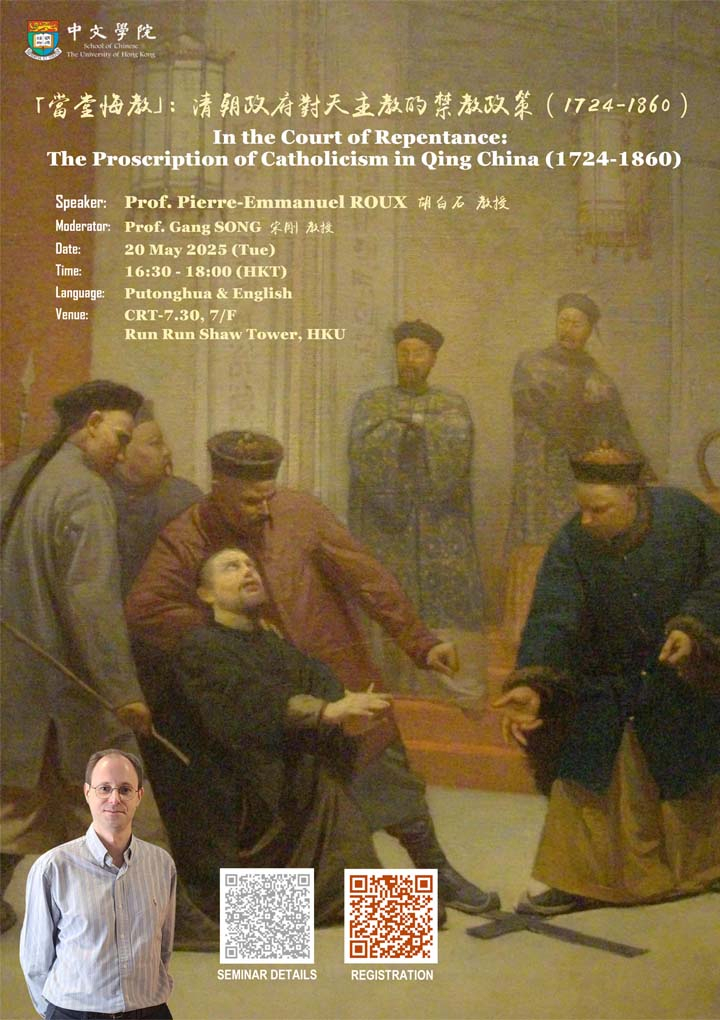「當堂悔教」:清朝政府對天主教的禁教政策(1724-1860)In the Court of Repentance: The Proscription of Catholicism in Qing China (1724-1860)

School of Chinese Scholar Seminar
「當堂悔教」:清朝政府對天主教的禁教政策(1724-1860)
In the Court of Repentance:
The Proscription of Catholicism in Qing China (1724-1860)
Speaker: Prof. Pierre-Emmanuel ROUX胡白石 教授
(Université Paris Cité)
Moderator: Prof. Gang SONG 宋剛 教授
(School of Chinese, The University of Hong Kong)
Date: 20 May 2025 (Tue)
Time: 16:30pm - 18:00pm (HKT)
Language: Putonghua & English
Venue: CRT-7.30, 7/F, Run Run Shaw Tower, Centennial Campus, HKU
Mode: Face-to-face & Online
Abstract:
清代雍乾嘉道年間,清政府對天主教實行愈演愈烈的禁教政策。以往的學術研究與聖徒傳記文學多關注歐洲傳教士及本地教徒如何遭受殘酷折磨並以殉教者身份犧牲。然而,事實遠非如此絕對。本演講通過探討清朝對天主教的禁教政策,基於大量東亞及歐洲的史料,重新審視宗教迫害問題,以及清政府所謂的閉關政策與中西交流中充滿衝突的歷史。研究發現,清政府對傳教士和教徒的懲罰往往只能收效一時,難以徹底根除天主教活動。與此同時,一種「反天主教的泛亞洲主義」逐漸浮現,而在這一體系中,「慎刑」、「悔改」與「棄教」才是清朝當局真正追求的目標。本演講由此提供了一部嶄新的天主教史觀,不僅涉及中國,亦延伸至東亞地區的鄰近國家。
Catholicism was officially proscribed in Qing China during the reigns of Yongzheng, Qianlong, Jiaqing, and Daoguang, and this anti-Christian policy was implemented in an increasingly strict manner. Previous academic studies and hagiographic literature have primarily focused on how European missionaries and local converts suffered brutal persecution and ultimately died as martyrs during this period. The reality is however far more complex. This lecture explores the Qing dynasty’s proscription of Catholicism, drawing on extensive historical sources from both East Asia and Europe to reassess religious persecution, the so-called closed-door policy of the Qing government, and the historical tensions in Sino-Western encounters. My research reveals that the punishments imposed by the Qing authorities on missionaries and converts were often only temporarily effective and failed to eradicate Catholic activities. At the same time, an “anti-Catholic Pan-Asianism” gradually emerged, within which “cautiousness in applying punishments” (shenxing 慎刑), “repentance” (huigai 悔改), and “apostasy” were, in fact, the key objectives pursued by the Qing authorities. This lecture thus offers a fresh perspective on the history of Catholicism, not only in China but also in neighboring East Asian countries.
About the Speaker:
胡白石(Pierre-Emmanuel Roux),巴黎西岱大學副教授,法國遠東學院(EFEO)訪問學者,法國學術期刊《遠東遠西(Extrême-Orient, Extrême-Occident)》主編,歐洲韓國學會(AKSE)財務主管。研究方向包括17-19世紀東西關係史,中韓日關係史,宗教史和法律史。
Pierre-Emmanuel Roux is an associate professor at Université Paris Cité and an invited research fellow at the French School for Asian Studies (EFEO). He is also the chief editor of the French scholarly journal Extrême-Orient, Extrême-Occident and the treasurer of the Association for Korean Studies in Europe (AKSE). His research interests include East-West encounters, China-Korea-Japan relations, religious history and legal history between the seventeenth and nineteenth century.
Notice:
1) The seminar will be conducted primarily in a face-to-face mode; Those who cannot attend the seminar in-person could apply for online participation (via Zoom);
2) All those who would like to attend the seminar are required to register online (Click HERE) on a first-come, first-served basis;
3) Email of confirmation will be sent to the registered email addresses and participants have to show the screenshot or print-out version of the email for entry of the seminar venue;
4) Walk-in or late-comers will not be allowed for entry of the seminar venue unless situation allows.
ALL are welcome*
*Pre-registration (Click HERE) is requested.
In the Court of Repentance: The Proscription of Catholicism in Qing China (1724-1860).jpg)







